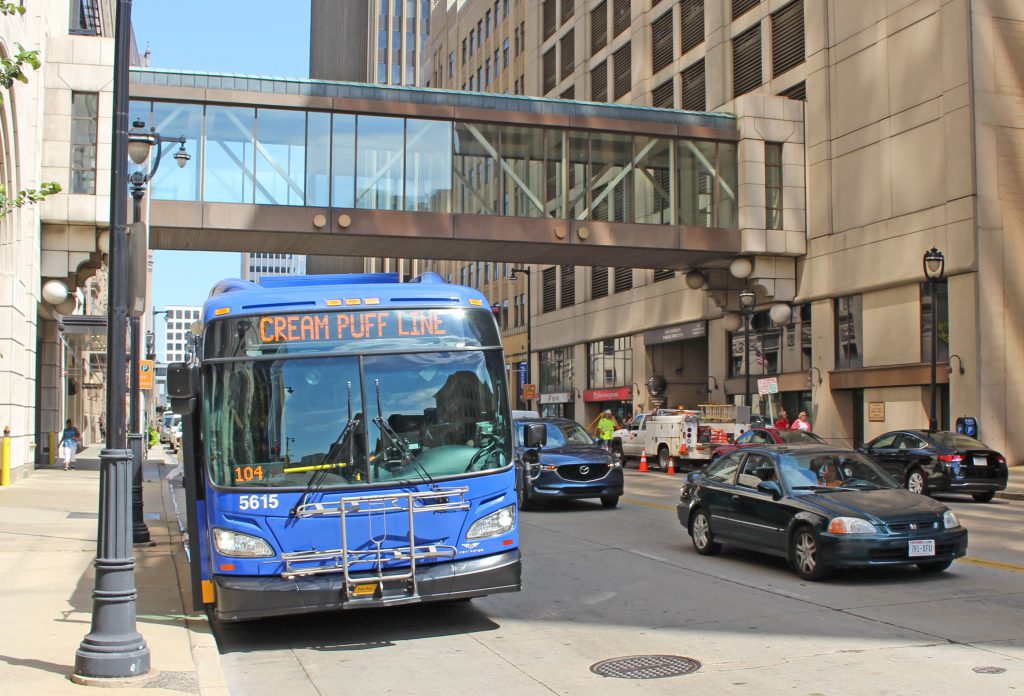Goodbye to Freeway Flyers, Festival Service?
Fiscal crisis, labor shortage could mean a permanent end for these transit services.
A number of transit services offered by the Milwaukee County Transit System (MCTS) that have been suspended in recent years will not return anytime soon, and unless transit sees new, sustainable revenue, are likely gone for good.
These services include the Freeway Flyers, Summerfest shuttle service, Wisconsin State Fair Service, the Brewers Line (Route 90) and service to the county’s ethnic festivals.
The service to the State Fair, the summer ethnic festivals and Brewers’ games were all suspended when the pandemic hit in 2020 and the events were cancelled. In June 2021, MCTS announced it would not be able to provide direct service to Summerfest, or these other summer events, because of an ongoing shortage of bus operators and available buses. Then in January this year, the system announced that the Freeway Flyers were temporarily suspended, which was upgraded to an indefinite suspension in March.
Now, MCTS has announced it will not budget these services in 2023 and does not have plans to resume them in the near future. Labor and equipment pressures mean providing these services could impact regularly scheduled transit service in other parts of the county. “These are great events, people have fun going to them, but to take a bus and put it on this service and then find out that we had some people call in sick and we can’t get the regular service out there is just counter to what we’re trying to do,” MCTS Managing Director Dan Boehm told the committee.
MCTS has struggled for more than a year to fully staff all the services it is budgeted to provide. In 2021, MCTS missed 7,487.2 planned service hours, or 0.56% of budgeted service. As of late April 2022, MCTS had been unable to provide approximately 1,401 planned service hours, or 0.37% of budgeted service.
As Urban Milwaukee has reported, the Milwaukee County Department of Transportation, which oversees the quasi-governmental MCTS, recently released a report that found no good solutions to the looming transit crisis.
“It’s really a symptom of the somewhat disregard for transit over the years, and the handcuffs the state’s put on the local municipalities and not being able to generate their own revenues for the services they value,” Boehm said.
The problem of insufficient funding and declining ridership is not new for the transit system. Nor is it the first time these services have been on the chopping block. In 2019, when the transit system was faced with a 10% cut to service to fill a budget deficit, MCTS identified Freeway Flyers, the Brewers Line and service to ethnic festival for cuts.
When the Freeway Flyers were initially suspended in January, they were only carrying about 10% as many passengers as they did prior to the pandemic. On top of that, the surge in disease caused by the Omicron subvariant of COVID-19 is taking a significant toll on the system’s workforce. As Donnell Shorter, president of the Amalgamated Transit Union Local 998 noted, “In January, we got hit really hard with the COVID. Our workforce, the people who were healthy were working unbelievable hours and they were getting burned out.”
For Summerfest, MCTS doesn’t have the manpower or the buses to continue providing the service. “We’ve had 100 buses out there, that’s 100 people at midnight ready to work,” Boehm said. “We just don’t have that at this point in time.”
“Our fleet is smaller than it was the last time we did Summerfest, and that’s the direction we’re headed as these fiscal concerns don’t get addressed,” Boehm said. “So it’s hard to commit to have 100 buses available at the end of the night. I think we’ve had as many as 120 at times.”
Shorter said the key to addressing the bus operator shortage is through retention of existing staff. “We’re hiring quite a few workers every month, but we’re not able to keep those people here.” There are a lot of contributing factors, Shorter said, but long hours, made worse by the labor shortage, is one of them.
The Local 998 has begun negotiations on a new three-year contract with MCTS, and Shorter told supervisors that the long hours operators work is an issue that’s already come up. “Our contract reads, where a operator can be held up to 18 hours a day,” he said. “Not actually driving 18, but 18 hours of the day that can be dedicated to transit.” This number has already come down “quite a bit” in negotiations for the new contract, he said.
MKE County
-
Fellow Judge Testifies in Dugan Case
 Dec 16th, 2025 by Graham Kilmer
Dec 16th, 2025 by Graham Kilmer
-
Key Questions in Dugan Trial Take Shape on First Day
 Dec 15th, 2025 by Graham Kilmer
Dec 15th, 2025 by Graham Kilmer
-
FTA Tells Milwaukee to Crack Down on Fare Evasion — Even Where Fares Don’t Exist
 Dec 12th, 2025 by Graham Kilmer
Dec 12th, 2025 by Graham Kilmer
Transportation
-
Congestion Pricing Cuts Air Pollution in New York City
 Dec 14th, 2025 by Jeff Wood
Dec 14th, 2025 by Jeff Wood
-
FTA Tells Milwaukee to Crack Down on Fare Evasion — Even Where Fares Don’t Exist
 Dec 12th, 2025 by Graham Kilmer
Dec 12th, 2025 by Graham Kilmer
-
Will GOGO’s Bus Service Ever Get Going?
 Dec 9th, 2025 by Jeramey Jannene
Dec 9th, 2025 by Jeramey Jannene





















How about them Bucks and Brewers and deep pockets at World Festivals funding some transit to their sites? They are the businesses who benefit from public transit which brings patrons they might not otherwise get. They have vacuumed enormous sums from the taxpayers, causing the crises the county and it’s transit system face.
Let the festivals provide these services. The Summerfest crowd is making millions and paying its employees massive salaries. If they want the people, they can pay for it.
The patriotic thing to do is to sacrifice our Freeway Flyer and Festival Service… and instead, spend $40 billion taxpayer dollars every week on Joe Biden’s war against Russia.
MCTS’ first mission is to serve the transportation needs of Milwaukee County Residents every day of the week. The festival shuttles are outside of this mission. Regular MCTS customers who want to get to the festival grounds, State Fair Park, and AFF can do so (as I have done) using regular routes.
As for the regular freeway flyer service, the suburb to downtown commuting model has been fading for years and is unlikely to rebound. These services are very inefficient to operate, requiring numerous non-revenue equipment moves.
This is really being caused by state legislature cutting shared revenue. On top of it they create rules about allocation of funds.
We’ve taken advantage of free shuttles to events provided by a number of area bars and restaurants and it has worked very well. I do think MCTS needs to more closely study ridership on some regular routes, for example 15 & GRE. I live along these routes and invariably see empty buses running frequently in the middle of the night.